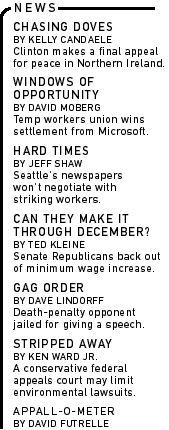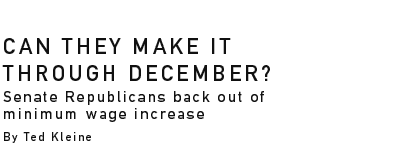 
|

|

|

|
| |
|
|
|
If you're working behind the cash register at the Piggly Wiggly or trimming hedges at Olde Orchard Estates, you won't be getting a raise this Christmas. George W. Bush is coming to Washington. In early December, once it became apparent that Bush would accede to the presidency, Senate Republicans backed out on a deal to raise the $5.15-an-hour minimum wage by $1 in exchange for $240 billion in tax cuts. Bush campaigned on a plan to cut taxes by $1.3 trillion, so his Senate allies decided to wait and go for the big money. "We are operating under the consensus that we could do much better next year," says a spokeswoman for Assistant Majority Leader Don Nickles (R-Oklahoma). Will the checkout girls and the lawn boys do better, too? That extra 40 bucks a week would have been enough to make payments on a used car, or buy health insurance for a small family--or pay this hard winter's heating bills, which are expected to be 50 percent higher than last year's. Instead, a lot of folks may be singing that old Merle Haggard tune, "If We Make It Through December." If the Republicans hadn't played sextuple-or-nothing with the tax cut proposal, more than 10 million workers might have seen their paychecks edge a little farther away from the poverty line this winter. Half those workers labor full time, and a third are raising children. GOP senators "will be much less predisposed to support a minimum-wage proposal with a Republican president coming in," predicts Jim Manley, press secretary for Massachusetts Democrat Edward Kennedy, who sponsored the wage increase in the Senate. The minimum wage is much more popular in the House, where some Republicans have to go home to blue- collar districts. House Speaker Dennis Hastert of Illinois negotiated the $1-an-hour increase with President Clinton, and still wants to see it passed. "The majority of the House is in favor of increasing the minimum wage," says John Feehery, a spokesman for Hastert. This gives hope to advocates of a wage increase. The public likes the minimum wage, so an increase may be one of the few bills Democrats and Republicans can agree on, says Larry Michel, an economist with the Economic Policy Institute. "I suspect we'll see it passed," Michel adds. "It's been something that's been pretty hard for Republican moderates to resist." But so far, Bush has not been very friendly to low-wage workers. In Texas, the minimum wage languishes at $3.35 an hour. (Some workers, especially in agriculture, are not covered by the federal standard.) But, Manley says, raising the minimum wage would also be a good way for Bush to build goodwill with Democrats. "Kennedy feels that if Governor Bush is serious about reaching across the aisle," Manley says, "then a minimum-wage bill would be a good way to start." You guys cleaning the grease trap at White Castle? Hang on until
spring--if you can.
|

